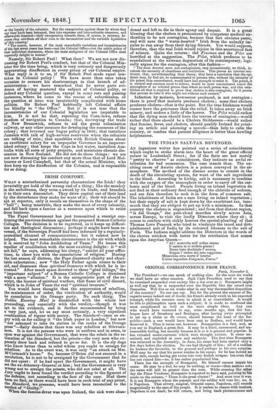IRISH COMFORT.
WHAT a scatterbrained perversity characterizes the Irish! they invariably get hold of the wrong end of a thing; like the monkey in the melodrama, they seize a sword by its blade, and brandish it to their own discomfort. They drive capital out of their land by the disturbance they make for want of it ; their wit should be apt at repartee, only it recoils on themselves in the shape of the "bull"; being miserable, they make the most of every calamity, and fall back upon a famine as a resource upon which to retire from business.
The Papal Government has just transmitted a rescript con- firming the previous decision against the proposed Roman Catholic Colleges. The decision is to be regretted, as it keeps up difficul- ties and theological dissensions ; perhaps it might have been re- versed, if the Sovereign Pontiff had been informed by a regularly- accredited channel of communication ; but it cannot now be helped. The most remarkable circumstance in the air with which it is received by "John Archbishop of Tuam." He issues this repeller of conciliation with the most exulting delight : it "will not fail," he says, addressing his clergy, "amidst all your afflic- tions, to cheer you with the consolations of religion." During the last season of distress, the Pope dispensed charity and chari- table exhortation ; now "the Holy Father again comes to their aid, and dispenses those spiritual treasures with which he is in- trusted." After much space devoted to these "glad tidings," the "important subject" of a Roman Catholic College is dismissed with a mere "allusion." It is the antagonistic part of the re- script, the licence of spiritual warfare, that flame of civil discord, which is to John of Tuam the real "spiritual treasure." You would have thought that the suppression of rebellion, the maintenance of order, the vindication of authority, would be consolation to the Orange party. No such thing. The Dublin Evening Mail is dissatisfied with the whole law Proceeding, and especially with the verdict,—though it was apt to the evidence, and is further recommended by being a very just, and, let us say most seriously, a very expedient combination of rigour with mercy. The Standard—once so an- gry with us for calling it "the Irish paper in London," but now "not ashamed to take its station in the ranks of the Orange press "—flatly denies that there was any rebellion at Slievana- mon. It is not the persons who were in uniform and in arms, in open war against the Government, that were the rebels in the es- timation of the Standard, but the priests—the very men who ex- pressly drew back and refused to go so far. It is the sly dogs who know better than to rebel whom you ought to arraign for rebellion. As to the overt war, it was only "an attack on Mrs. M'Cormack's house." So, because O'Brien did not succeed in a revolution, he is not to be arraigned by the Government that he did not upset : if he had upset the Government, it might have set the ex-Attorney-General at him ; but the Government is very wrong not to arraign the priests, who did not rebel at all. The Jury ought to have found the verdict according to the figment of the defence, not according to the fact of the case. Had there been no fact, as there would have been in such trial of any priest, the Standard, we presume, would have been reconciled to the verdict of "Guilty." When the famine-fever was upon Ireland, the sick were aban- doned and left to die in their agony and despair. It is a great blessing that the cholera is pronounced by competent medical au- thorities to be not contagious, because that fact obviates panic, and will save the "warm-hearted" Irish from the unlucky im- pulse to run away from their dying friends. You would suppose, therefore, that the real Irish would rejoice in this ascertained fact of science. Quite the reverse : thg Freeman and the Pilot are horrified at the suggestion. The Pilot, which professes to be scandalized at the extreme dogmatism of its contemporary, logi- cally argues for the contagion, after this fashion—. "The most devoted mere non-contagionists, very inconsistently, we think, in- culcate the necessity of cleanliness and ventilation. This proves an internal sen- timent, that, notwithstanding their theory, they have a conviction that the epi- demic may, by foul air, be communicated to persona who, without the intensity of the poison thus concentrated, would have had strength to resist it. The poison, it is natural and common sense to believe, would be more concentrated round the atmosphere of an infected person than where no such person was; and this esta- blishes all that is required to prove that cholera is also contagious, for it proves that persons do take it who might not without such contact."
Infection by malaria, howsoever produced, is not contagion : there is proof that malaria produces cholera ; none that cholera produces cholera—that is the point. But the true Irishman would sooner have the grievance than the relief. It takes away an Irish misery, and undoes a little of the horror. The Pilot would rather that the dying man should have the terrors of contagion—would rather that there should be a Cholera Skibbereen—would rather that famine, fever, and cholera, should qualify Ireland for point- ing an article and adorning a speech—than help to calm the country, or confess that patient diligence is better than howling helplessness.
























 Previous page
Previous page